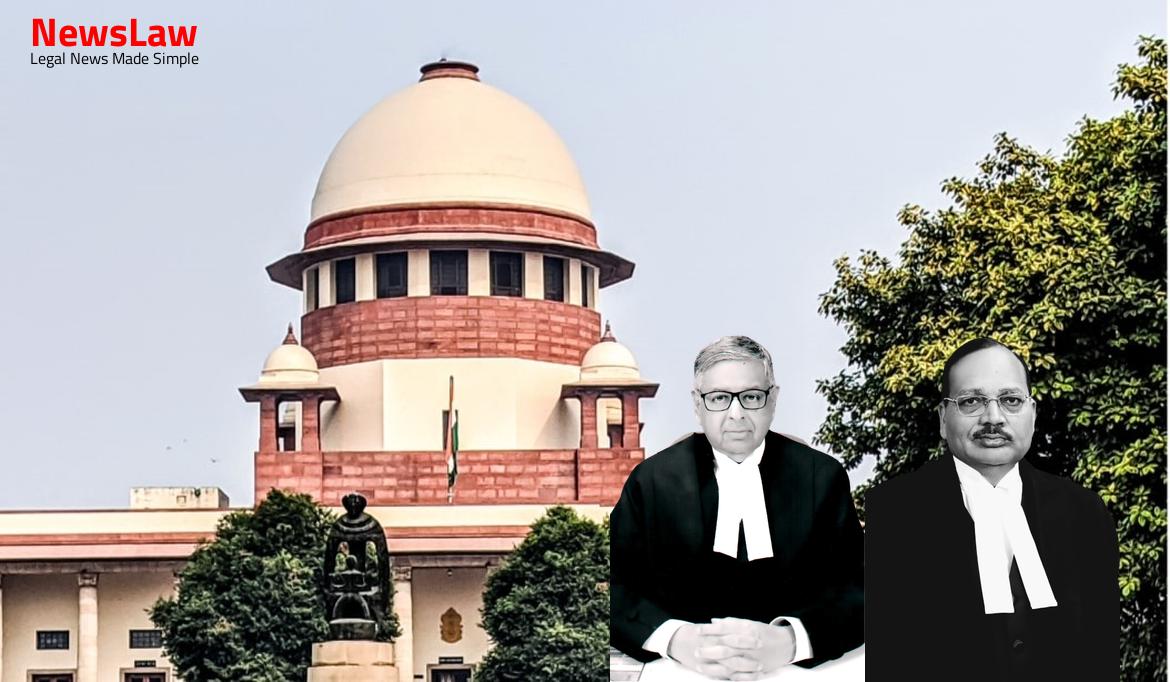Explore a detailed legal analysis of the validity of a gift deed under the Tenancy Act. The court’s judgment underscores the importance of compliance with statutory provisions, including Section 30D and 30DD, in agricultural land transfers. Emphasis is placed on the significance of valid acceptance in gift deeds, as per Section 122 of the Transfer of Property Act, 1882. The blog dissects the implications of the court’s legal analysis for ensuring lawful transfers within the legal framework. #LegalAnalysis #GiftDeed #TenancyAct
Facts
- The Division Bench held that the Single Judge passed the judgment in ignorance of Section 30C and 30D of the Tenancy Act of 1955.
- Division Bench set aside the Single Judge’s order and upheld the Board of Revenue’s order.
- Division Bench erred in not recognizing the transfer of 17.25 acres to the appellant’s son, who was a major at the time of the gift deed execution.
- The Division Bench held the gift deed as invalid due to the son’s alleged unawareness.
- The Revenue Ceiling Department re-opened the case of the appellant on 15.03.1982.
- The earlier order passed by the Court of Deputy Sub-Divisional Officer, Pali was rendered without investigating the recognition of land transfers as per Section 30 of the Tenancy Act of 1955.
- The Collector directed the appellant to handover 11 standard acres of extra land to the Tahsildar, Pali.
- The High Court allowed the writ petition of the appellant on 02.04.1997, determining that the land transfer by gift was valid before the Ceiling Act of 1973.
- The Court observed that as per the amendment of the Tenancy Act of 1955, the gift deed executed before the amendment was valid.
- The Board of Revenue modified the earlier order and held that the appellant was holding 4.5 standard acres of land in excess of the ceiling limit.
- The Additional District Collector, Pali declared the mutation of land in favor of the appellant’s son invalid due to lack of acceptance of the gift.
Also Read: Electoral Malpractices in Mayor Election
Arguments
- The transfer of land was effectuated in 1963.
- The transfer does not violate the provisions of Section 30C and Section 30D of the Tenancy Act of 1955.
- The son was living separately with his family based on the facts of the case.
- There was an implied acceptance due to the transfer being between father and son.
- The issue of limitation was not argued by the appellant in the lower courts.
- However, the notice for reopening the case was issued within the limitation period.
- Key issues for consideration include the limitation period for reopening the case, validity of the registered gift deed, and the judgment’s awareness of Sec 30C and 30D of the Tenancy Act of 1955.
- Section 15 of the Ceiling Act of 1973 grants the State Government the power to reopen cases if the earlier order was against the Act and prejudicial to state interest.
- Respondents argue that the Division Bench rightly upheld the Board of Revenue’s order after a thorough assessment based on the Tenancy Act.
Also Read: Balancing Power and Transparency: Electoral Bonds Struck Down, Disclosure Mandated
Analysis
- Section 122 of the Transfer of Property Act, 1882 defines a gift as the transfer of certain existing movable or immovable property made voluntarily and without consideration by a donor to a donee, accepted during the donor’s lifetime.
- Acceptance of a gift must be made during the lifetime of the donor and while the donor is capable of giving. If the donee dies before acceptance, the gift is void.
- Section 123 of the Transfer of Property Act, 1882 outlines the requirements for making a gift of immovable property through a registered instrument signed by the donor and attested by at least two witnesses.
- The judgment analyzed the provisions of Sections 30D and 30DD of the Tenancy Act of 1955 regarding transfers of agricultural land and ceiling limits.
- It highlighted the importance of valid acceptance of a gift, either by express conduct or implied behavior of the donee.
- The judgment discussed the significance of registered gift deeds, mutation records, and statements of both the donor and donee in determining the validity of a transfer.
- It emphasized the need for compliance with statutory provisions while making transfers of agricultural land, especially concerning ceiling limits and exceptions under relevant laws.
- The analysis underscored the legislative intent behind Sections 30D and 30DD to protect the rights of agriculturalists and ensure valid transfers of land within the legal framework.
- Voluntary transfers made by a person after 25-2-1958, except by way of partition or to a landless person are not recognized for determining ceiling area under Section 30C.
- The burden of proof lies on the transferor to determine if the transfer falls under the exceptions.
- Transfers exceeding the ceiling area applicable to the transferee are not recognized.
- Definition of ‘agriculturist’ specified.
- Exceptions for transfers made before specified dates to agriculturists or for specific purposes.
- Clarification on the validity criteria for gifts under Section 122 of the Transfer of Property Act, 1882.
- The Additional District Collector found no semblance of acceptance in the gift deed.
- Gifts do not involve any payment of consideration or compensation.
- Upon making a gift, the donor loses title and the donee becomes the absolute owner.
- The Division Bench of the High Court agreed with the Board of Revenue that there was no valid acceptance by the donee.
- Acceptance of a gift should occur during the donor’s lifetime and while the donor is competent.
- The execution of a registered gift deed, acceptance, and delivery of the property are necessary for a gift to be complete.
- A previous three-Judge Bench case highlighted the importance of acceptance in gift deeds.
- The provisions of the Ceiling Act of 1973 do not apply as the case was reopened and decided under the Tenancy Act of 1955.
- The gift deed was executed before the specified dates under the Ceiling Act of 1973, making it exempt from Section 6.
- No evidence of extraneous consideration for the gift deed in this case.
- The transfer of land by the appellant-donor to the donee-son is considered a bona fide transfer exempt from Section 6 of the Ceiling Act of 1973.
Also Read: Recall of Resolution Plan Approval: Legal Analysis
Decision
- The appeal stands allowed in the aforesaid terms.
- Pending applications, if any, stand disposed of.
Case Title: DAULAT SINGH (D) THR. LRS. Vs. THE STATE OF RAJASTHAN (2020 INSC 684)
Case Number: C.A. No.-005650-005650 / 2010



